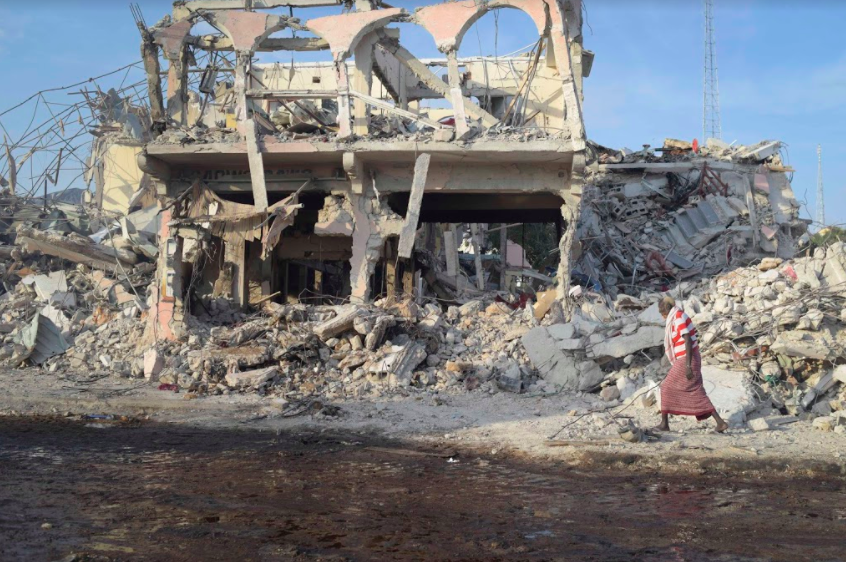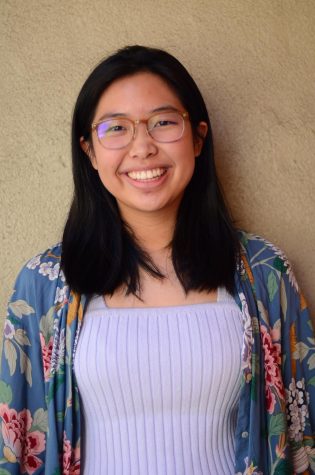Mogadishu bombings kill hundreds in Somalia
Courtesy of Wikimedia Commons
A Somali walks in front of the rubble of a building due to the Oct. 14 bombing in Mogadishu. Somali president Mohamed Abdullahi declared three days of national mourning for the bombing.
November 16, 2017
A double truck bombing killed at least 358 people and severely injured 30 in Mogadishu, Somalia on Oct. 14. The victims were airlifted to the nearest emergency hospital in Turkey, and no terrorist organization has yet claimed responsibility for the attack.
This attack is the most deadly in almost all of sub-Saharan Africa in recent years. Officials believe the trucks’ proximity to a fuel tanker exacerbated the explosion.
Even though no terrorist group has claimed responsibility, many suspect the terrorist group Al-Shabaab, which has been waging war with the Somali government for over a decade.
“Al-Shabaab is the only arms group in Somalia, and really East Africa, that are capable, on a regular basis, in carrying out similar types of large scale attacks, specifically with explosive, vehicle-borne devices,” research fellow at the Harvard Kennedy School Christopher Anzalone said. “There is also a precedent where Al-Shabaab is likely to carry out an attack and not claim it.”
According to the U.S. Department of State, the United States has provided a total of 1.5 billion dollars to Somalia in funds for drought, famine and refugees since 2006. Additionally, the U.S. works with organizations, such as the United Nations, on peacekeeping and maintaining security in the country.
“[The U.S.] will continue to stand with the Somali government, its people and our international allies to combat terrorism and support their efforts to achieve peace, security and prosperity,” a statement released by the Department of State said.
Haris Hosseini (11) believes that few people in the school community have understanding of the bombing due to limited media coverage. He volunteered alongside his father, Khaled Hosseini, an ambassador for the UN Refugee Agency, to help communities in Uganda.
“I think that at some point we have to recognize that in our society, Western lives take greater importance in the media,” he said. “I never want to compare or contrast disasters or tragedies or massacres, but ultimately at the end of the day, we have to recognize that we give very unbalanced attentions to certain problems, and that has to do with the fact that Western citizens and people are seen as inherently more significant in our social fabric.”
This piece was originally published in the pages of the Winged Post on November 16, 2017.


















![“[Building nerf blasters] became this outlet of creativity for me that hasn't been matched by anything else. The process [of] making a build complete to your desire is such a painstakingly difficult process, but I've had to learn from [the skills needed from] soldering to proper painting. There's so many different options for everything, if you think about it, it exists. The best part is [that] if it doesn't exist, you can build it yourself," Ishaan Parate said.](https://harkeraquila.com/wp-content/uploads/2022/08/DSC_8149-900x604.jpg)




![“When I came into high school, I was ready to be a follower. But DECA was a game changer for me. It helped me overcome my fear of public speaking, and it's played such a major role in who I've become today. To be able to successfully lead a chapter of 150 students, an officer team and be one of the upperclassmen I once really admired is something I'm [really] proud of,” Anvitha Tummala ('21) said.](https://harkeraquila.com/wp-content/uploads/2021/07/Screen-Shot-2021-07-25-at-9.50.05-AM-900x594.png)







![“I think getting up in the morning and having a sense of purpose [is exciting]. I think without a certain amount of drive, life is kind of obsolete and mundane, and I think having that every single day is what makes each day unique and kind of makes life exciting,” Neymika Jain (12) said.](https://harkeraquila.com/wp-content/uploads/2017/06/Screen-Shot-2017-06-03-at-4.54.16-PM.png)








![“My slogan is ‘slow feet, don’t eat, and I’m hungry.’ You need to run fast to get where you are–you aren't going to get those championships if you aren't fast,” Angel Cervantes (12) said. “I want to do well in school on my tests and in track and win championships for my team. I live by that, [and] I can do that anywhere: in the classroom or on the field.”](https://harkeraquila.com/wp-content/uploads/2018/06/DSC5146-900x601.jpg)
![“[Volleyball has] taught me how to fall correctly, and another thing it taught is that you don’t have to be the best at something to be good at it. If you just hit the ball in a smart way, then it still scores points and you’re good at it. You could be a background player and still make a much bigger impact on the team than you would think,” Anya Gert (’20) said.](https://harkeraquila.com/wp-content/uploads/2020/06/AnnaGert_JinTuan_HoHPhotoEdited-600x900.jpeg)

![“I'm not nearly there yet, but [my confidence has] definitely been getting better since I was pretty shy and timid coming into Harker my freshman year. I know that there's a lot of people that are really confident in what they do, and I really admire them. Everyone's so driven and that has really pushed me to kind of try to find my own place in high school and be more confident,” Alyssa Huang (’20) said.](https://harkeraquila.com/wp-content/uploads/2020/06/AlyssaHuang_EmilyChen_HoHPhoto-900x749.jpeg)







